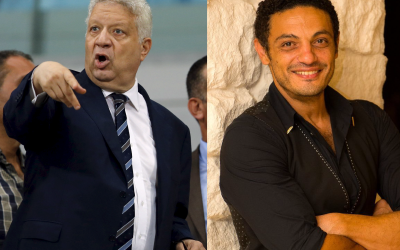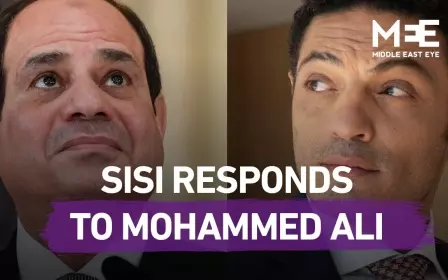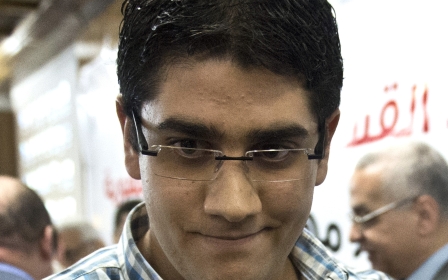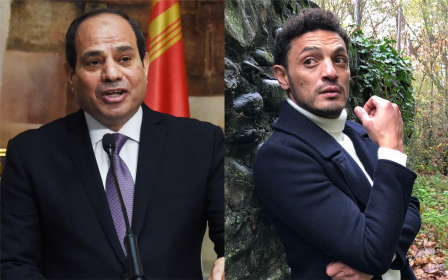Mohamed Ali: Folk hero, whistleblower, and talk of the town

In early September, as videos of Egyptian film star and property tycoon Mohamed Ali went viral, a group of plainclothes conscripts, working as guards at a Cairo military hospital, were enthralled.
They sat, during their shift, just blocks away from the Ministry of Defence, watching Ali accuse top government and military officials of corruption when suddenly a superior officer walked in.
'Everyone watches them, but no one dares speaking about them'
- Ismail, military conscript
“I thought we would be court-martialled and maybe jailed,” Ismail, one of the conscripts, told Middle East Eye.
Instead, the officer asked Ismail and his colleagues to send him the videos on WhatsApp: he wanted to watch them, too.
The 43-year-old Egyptian whistleblower has released over a dozen videos from self-exile in Spain, laying out in detail how he says officials misappropriated millions in public funds for their personal projects.
Over the past 15 years, as the owner of a property company that contracted with the Egyptian military on major construction projects, Ali says he has had a front-row seat for all of it - and he's speaking out now because he hasn't been paid.
In a country where media is tightly controlled by the state and public dissent is hard to come by, Ali’s regular dishing sessions have captured the nation’s attention.
“Everyone from the newcomers to the highest-ranking officers in the hospital or in the unit [where he spends his nights] watch the videos secretly,” Ismail said, describing the viral videos as “porn”.
“Everyone watches them, but no one dares speak about them.”
'Man of the people'
Alongside his contract work, Ali has also worked as a film actor and producer, but his screen time had largely gone unnoticed until he started posting his videos.
Overnight, he became one of Egypt’s most high-profile and controversial figures, a folk hero to some, an enemy of the state to others, stirring up Egyptians all over the world.
'He is not an officer who is shouting, nor is he a politician in a fancy suit. He is a man of the people'
- Essmat, microbus driver
Now he's called for Egyptians to take to the streets on Friday for one hour. If the number of people who respond and go out reaches 30 million, he told his viewers, Sisi should resign.
“You can hate him as much as you want,” Noura, a retired journalist, told MEE. “But we have to agree that he made millions of people talk about a topic that was an extreme taboo which is corruption in the military.”
Noura now starts each day checking Ali’s Twitter and YouTube accounts to see if Ali has posted anything new overnight. She’s not alone.
“Now you can see families and friends who rarely discussed politics or who had very different opinions agreeing on his statements,” she said.
Noura said she will participate in the protests that Ali has encouraged: “We should not be afraid of the regime, and people should come together to express their discontent.”
Ali’s videos have sparked a public debate over the contradiction between Sisi urging Egyptians to cut their spending, and his alleged use of the army’s budget to fund his palatial residences.
Egypt's war of hashtags: Mohamed Ali's social media campaigns
+ Show - HideFollowing Mohamed Ali’s videos, a number of hashtags have gone viral, calling on the Egyptian president to step down.
In a video posted on 15 September, Ali called on Egyptians to use the hashtag #كفايه_بقى_ياسيسى (That’s enough Sisi) which was trending at number one in Egypt and at number six worldwide.
Since then, the hashtags #ارحل (step down) الشعب_يريد_إسقاط_النظام
The videos and trending hashtags have sparked a counter hashtag, #احنا معك يا سيسي (We are with you Sisi) from government supporters. The hashtags have been a key part of sparking debate about the current conditions in Egypt, with people using them to discuss living conditions and socio-economic problems.
“His working-class yet expressive manner of saying what he wants is what made people feel connected to his claims,” Essmat, a microbus driver, said of Ali.
“He is not an officer who is shouting, nor is he a politician in a fancy suit. He is a man of the people who is wealthy but is not ashamed of his roots or background.”
Essmat said that in the first couple of days, when the videos went viral and then Sisi responded last Saturday to the claims during the eighth National Youth Conference, it was all anyone could talk about as he drove around Cairo.
“People are always comparing their own status and the status of the country and the lack of services and jobs with the lavish lifestyle that Sisi, his wife and family are living in,” the microbus driver said.
During one journey, an argument broke out between an older man and a younger female passenger who was watching one of Ali's videos, with the man yelling at her and calling her a traitor.
“I stopped the car, asked the older man to step out of the car ,and gave him back his money, and told him ‘no ass-kissing in this car’,” he said.
Despite the rules he keeps in his microbus, Essmat said he won’t protest, fearing that the police are more violent than ever before.
“I fear for my family and many people do,” he said. “They are angry, but they are afraid of the oppression.”
Not quite Robin Hood
While attracting viral support, Ali’s work as a military contractor has also drawn criticism from those who say he is a hypocrite attacking the same system that once made benefited him.
“He was a part of the scandals that he talks about, and he decided to talk to the public because he didn’t get the rest of his money,” said Shenoda Saleb, a computer engineer in Alexandria.
'He was a part of the scandals that he talks about'
- Shenoda Saleb, computer engineer
Saleb doesn't sympathise much with Ali, but regardless, he has raised awareness among Egyptians at a time when the state controls much of the media and has snuffed out dissent, something he can get behind.
“I don’t see him as a Robin Hood, but I am for anything that causes trouble for the regime,” he added, saying he will be watching to see if any protests break out.
It’s not only the public that has been electrified by Ali, but intelligence officials around Sisi have also been rattled.
A source affiliated with Egypt’s General Intelligence Service told MEE that the president had been advised by intelligence officials to ignore Ali’s videos and refrain from making public comments.
But Sisi went ahead and made comments at the youth conference anyway – his first acknowledgement of Ali’s accusations – saying that intelligence agencies had begged him not to address the claims.
The source said the president’s intervention was poorly received among the intelligence community.
“It indeed caused some anger, especially that the non-official manner the president used to address the claims [only] widened the discussion about them,” the source said.
Since the speech, there have been several reports of dissent among military officials, but the source denied the reports, saying there were no divisions in the military’s ranks.
The same source said he believed there is only a small possibility that the protests that Ali has called for on Friday will actually materialise on the streets.
But security forces, he said, may be concerned that his call sparks Egyptians to protest over other issues, like lack of services.
On Tuesday, residents in Cairo’s Eyen el-Sera neighbourhood were demonstrating against the government’s decision to forcefully evacuate cemeteries in the Zienhom district.
“People then gathered and chanted against the government,” the source said.
In response to Ali's call for protests, the Ministry of Interior has declared a high state of alert, cancelling time off for all officers and personnel, a source in the ministry told MEE.
He said that on Friday, riot police will be deployed in working-class areas, popular squares, and government buildings - just in case.
This article is available in French on Middle East Eye French edition.
Middle East Eye propose une couverture et une analyse indépendantes et incomparables du Moyen-Orient, de l’Afrique du Nord et d’autres régions du monde. Pour en savoir plus sur la reprise de ce contenu et les frais qui s’appliquent, veuillez remplir ce formulaire [en anglais]. Pour en savoir plus sur MEE, cliquez ici [en anglais].





